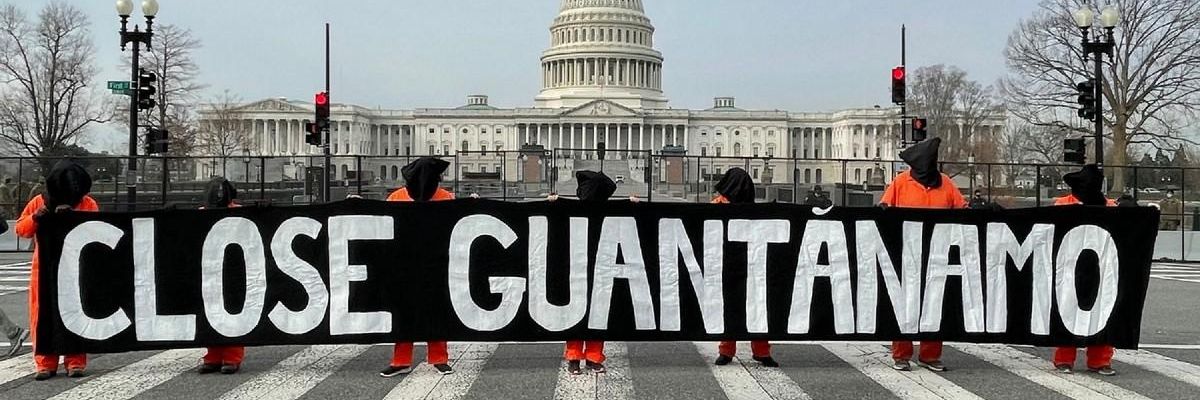A recent Senate Judiciary Committee hearing on closing Guantanamo Bay prison coincided with Congress' approval of a $778 billion military budget that no one asked for: it was, in fact, $25 billion more than the Commander-in-Chief had requested.
Our current "defense" budget costs taxpayers more than $2 billion a day, or $7.7 trillion over the next decade.
This Congressional largesse to the military went largely undebated and unnoticed, in stark contrast to the firestorm of controversy accompanying even a hint of appropriations for health care, education, and infrastructure.
Our current "defense" budget costs taxpayers more than $2 billion a day, or $7.7 trillion over the next decade. Contrast that with proposed infrastructure spending over those same ten years, and you get a good picture of Congress' priorities: $7.7 trillion for the military, and $3.5 trillion for infrastructure--a figure certain to decline. We spend more on the military than the next 11 nations combined, including China, Russia and India.
Which brings us to Guantanamo. The Senate hearing, which featured panelists ranging from military generals to Colleen Kelly, a 9/11 family member, affirmed that the prison and military tribunal system chosen to try those suspected of war against the US has been an utter and abject failure, wasting taxpayer dollars and resulting in only two convictions in 20 years. We've spent $6 billion since opening the prison, and currently spend $13 million per prisoner, per year, to keep it open.
Today, there are 39 detainees in Guantanamo, and after two decades, more than two-thirds of them have never been charged with a crime. Thirteen have been recommended for transfer but haven't been released. And twelve are in a military commission system in which only two have been convicted. In contrast, the stateside Department of Justice has successfully prosecuted nearly 1,000 individuals on terrorism related charges in that same period of time.
To be sure, there are a handful of bad people in Guantanamo--including Khalid Sheikh Mohammed (KSM), named in the 9/11 Commission Report as "the principal architect of the 9/11 attacks." But his prosecution remains at an impasse because of the use of torture by the US, making a hash of attempts to bring defendants to trial at all, and overclassifying of information, making it impossible to bring certain evidence to trial even after it has been made publicly available through the media.
Kelly, a 9/11 family member who, with me, co-founded September 11th Families for Peaceful Tomorrows, noted that 20 years after the event that took the lives of both our brothers, no one has been held accountable. We support the idea of plea agreements for those remaining at Guantanamo like KSM, with admissions of guilt taking the death penalty off the table and replacing it with life in prison, a measure that would provide some amount of accountability and resolution.
You might find testimony from members of the military surprising: they did not mince words about the need to close Guantanamo immediately. By contrast, my North Carolina Senator Thom Tillis wants to keep the prison open. He predicted that Isis-K would attack American interests in 6-12 months, followed by an attack from Al-Qaeda a year or two afterwards, due to our "precipitous" departure from Afghanistan and the calls to close Guantanamo. Texas Senator Ted Cruz asserted the "metaphysical certainty" that releasing terrorists would mean the deaths of more Americans.
According to these Senators, 20 years and $8 trillion into the war on terror, including $6 billion for Guantanamo, we are exactly where we were 20 years ago, just as vulnerable and just as likely to be attacked.
According to these Senators, 20 years and $8 trillion into the war on terror, including $6 billion for Guantanamo, we are exactly where we were 20 years ago, just as vulnerable and just as likely to be attacked. That's not an endorsement of the military's efficacy--it's an argument for a new approach.
Given the growing list of terrors Americans deal with every day--the terror of not having a place to live or enough food to eat, the terror of not having physical and mental health care, the terror of gun violence and police violence, the terror of poverty and debt--the prospect of a Guantanamo detainee coming down their chimneys in 2021 rings particularly hollow. But it does beg the questions: if our country spends more than $2 billion a day on national defense, why are we so afraid? Shouldn't that expenditure earn us the right to walk around without a care in the world? And if $2 billion a day isn't enough, what is?
It's fair to ask: what would America look like if we spent $2 billion a day on education, affordable housing, health care, or infrastructure? Wouldn't these things make us safer and more free? And wouldn't adopting a more reasonable military budget, and closing the failed Guantanamo Bay prison, give us the money to get started?

